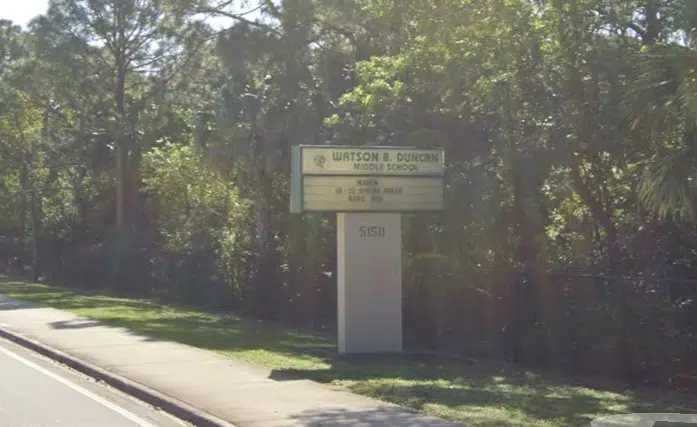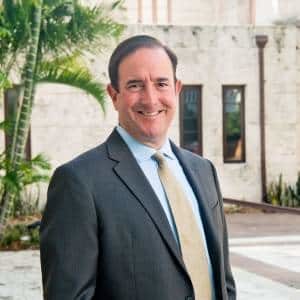
A middle school teacher in Palm Beach County is facing serious accusations following an investigation into inappropriate conduct. Christopher T. Withers, 32, who taught at Watson B. Duncan Middle School, located at 5150 117th Ct N, Palm Beach Gardens, FL 33418, was taken into custody on March 31, 2025. Authorities have charged him with over 16 counts of lewd and lascivious behavior, stemming from allegations of a sexual relationship with a former student, according to WPBF.
The investigation began on March 25 when the Palm Beach Gardens Police Department received a complaint. According to the arrest affidavit, the victim, who had Withers as a seventh-grade math teacher, described a series of incidents that escalated over time.
The victim revealed that their communication began on Snapchat, evolving into exchanges of a sexual nature. By the time she reached high school, interactions with Withers extended beyond messaging. She recalled spending time with him in his classroom, where inappropriate physical contact allegedly occurred.
The situation intensified as the pair reportedly met at secluded locations, his apartment, and public parks. The victim disclosed that intercourse began when she was 14, continuing until she was 15. She also stated that Withers recorded at least one encounter on Snapchat.
During questioning, Withers initially denied much of the victim's account. However, left alone in the interview room, he admitted to the relationship. He confirmed engaging in sexual acts with the victim approximately 10-15 times, corroborating her statements and acknowledging that he had recorded one encounter.
Watson B. Duncan Middle School issued a statement to families and staff, addressing Withers' arrest and confirming that he will not return to the campus. The school underscored its commitment to student safety and urged anyone with further information to contact authorities.
The Palm Beach County School District Police Department has been working closely with local law enforcement throughout the investigation.
Withers remains in custody at the Palm Beach County Jail as legal proceedings move forward. The charges against him have raised significant concerns within the community, with many expressing outrage and disbelief over the allegations.
This case serves as a reminder of the importance of vigilance in protecting students and ensuring that schools remain safe environments for learning. The investigation is ongoing, and updates are expected as the case progresses.

Victims of sexual abuse by educators often face overwhelming challenges when deciding how to move forward. In this interview, Pennsylvania child sexual abuse attorney Guy D’Andrea explains the legal steps available to those impacted by such misconduct. From criminal charges to civil lawsuits, he provides valuable information on how victims and their families can take action, hold perpetrators accountable, and begin the process of healing.
Darla Medina (Editor): Thank you for joining us, Mr. D’Andrea. What legal options are available for victims of abuse by a teacher, particularly in cases like this one?
Guy D’Andrea (Attorney): Thank you for having me. Victims of abuse by a teacher have both criminal and civil avenues available. On the criminal side, the state prosecutes the perpetrator, as we’re seeing in this case with multiple charges against the teacher. This ensures accountability and aims to protect the public from further harm.
Medina: And what about civil cases? What can victims pursue there?
D’Andrea: Civil cases are an opportunity for victims to seek compensation for the harm they’ve suffered. This can include damages for emotional trauma, therapy costs, and other impacts on their lives. In many situations, schools or districts can also face civil liability if they failed to act appropriately or ignored warning signs about the teacher’s behavior.
Medina: How does the victim’s age and the timeline of events affect these cases?
D’Andrea: Age is a critical factor. Many states, including Florida, have specific laws addressing abuse of minors. Additionally, statutes of limitations play a role in civil cases, but some states have extended or removed these limits for child sexual abuse cases. It’s important for victims to consult an attorney promptly to understand their rights and timelines.
Medina: What would you advise victims or their families to do if they suspect abuse?
D’Andrea: The most important step is to report the abuse to law enforcement immediately. Beyond that, seeking legal counsel is key to navigating both the criminal and civil aspects of the case. Victims should also prioritize connecting with support networks or counseling services to begin the healing process.
If your child has been sexually abused by a teacher, you don’t have to face this difficult journey alone. Our team is here to provide guidance, support, and legal expertise to help you understand your options and seek accountability. Contact us today for a free, confidential consultation, and let us help you take the first step toward protecting your child’s future and achieving the justice they deserve.
 info@legalherald.com
info@legalherald.com